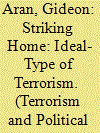| Srl | Item |
| 1 |
ID:
084672


|
|
|
|
|
| Publication |
2008.
|
| Summary/Abstract |
Recent events have led to a renewed scholarly interest in empire and the question whether the United States and its policies abroad constitute an "American Empire." This essay clarifies the various uses of the term and argues that conceptual overstretching retards scholarly analysis of the phenomenon. This essay suggests a definition of the term "empire" and provides an ideal-typical reference point to study its empirical variations. I provide a typology of empires to guide the analysis of common features as well as distinguishing characteristics. We can then answer the question whether contemporary manifestations might differ from their historical precursors. American unilateralist policy today differs in fundamental respects from previous imperial processes and structures. In contradistinction with earlier empires, U.S. policies lack the incentive structures for peripheral elites and local populations that typified imperial rule in the past. While falling short of constituting a formal empire, its policies face the same contradictions that confronted the western maritime empires as well as the USSR and which led to their dismemberment.
|
|
|
|
|
|
|
|
|
|
|
|
|
|
|
|
| 2 |
ID:
091917


|
|
|
|
|
| Publication |
2009.
|
| Summary/Abstract |
Hans Morgenthau was a founder of the modern discipline of International Relations, and his Politics among Nations was for decades the dominant textbook in the field. The character of his Realism has frequently been discussed in debates on methodology and the nature of theory in International Relations. Almost all of this discussion has mischaracterized his views. The clues given in his writings, as well as his biography, point directly to Max Weber's methodological writings. Morgenthau, it is argued, was a sophisticated user of Weber's views who self-consciously applied them in the sphere of International Relations in such a way that Realism provided an ideal-typical model of the rational and responsible statesman. This interpretation both explains Morgenthau's views and shows them to be a serious, complex, and compelling response to the issues which have animated the controversies over International Relations theory after Waltz's presentation of the methodological basis for his neo-Realism.
|
|
|
|
|
|
|
|
|
|
|
|
|
|
|
|
| 3 |
ID:
169920


|
|
|
|
|
| Summary/Abstract |
This essay presents some preliminary notes in an anthropological perspective on terrorism. The following aims to be a questioning review of issues that haunt informed students of terrorism, and yet also an introductory text to the study of terrorism. It is revisionist but didactic. The essay is based on extended research of Palestinian and Israeli terrorism cases, and on critical integration of the literature on terrorism. It offers an alternative approach to the problem of the definition and distinct character of terrorism, expands on overlooked aspects of terrorism, like its relationship to the concept of “home,” emphasizes under-theorized subjects, like the randomness of the targets, and discusses hitherto untouched topics, like the “bad death” of terrorism’s victims. Terrorism is examined in terms of liminality and hybridity, and consequently as more subversive than coercive, threatening our ontological security no less than our physical security.
|
|
|
|
|
|
|
|
|
|
|
|
|
|
|
|